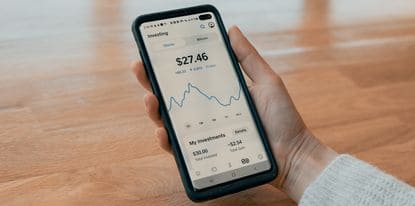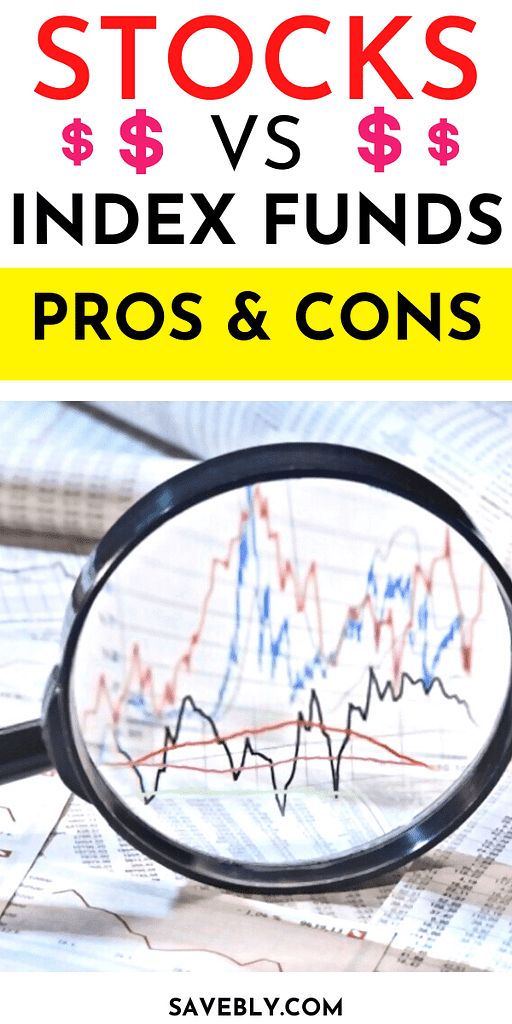Individual Stocks vs Index Funds (Pros And Cons)
Should you pick your own stocks or buy index funds? The debate of individual stocks vs index funds rages on, so which one do you choose?
Well, it comes down to your personal preference and financial situation.
Typically, those with less experience should opt for index fund investing since there is less risk.
Picking individual stocks requires more research and knowledge of financial markets.
Let’s dig deeper to see which is the best option for you…
Index Funds Vs Stocks?

When choosing between individual stocks and index funds, you might find that a mix of both is the best option for you.
This way, you’ll get the best of both worlds!
You will get diversification with index fund investing, and you also get to feed your inner trader by picking individual stocks.
Of course, your return on investment (ROI) is the most critical factor in investing, but being persistent is equally essential.
If you cannot keep up with business news and research companies, then index fund investing might be your best option.
On the other hand, if you love to stay up-to-date with business trends and dig into financial reports, then individual stocks might be better for you.
As I said earlier, a mix is always an option, so you don’t have to choose between the two options.
Let’s get into the key differences and outcomes one can expect between index funds vs stocks and the pros and cons of each…
What Are Index Funds?

An index fund is a type of mutual fund investing. It’s constructed to track a stock market index like the Dow Jones Industrial Average or the S&P 500.
Mutual funds use a broader range of investment assets and strategies.
Index funds make up the majority of core portfolio holdings in retirement accounts. They follow the overall market and have low operating expenses, which makes for a great passive investing strategy.
Index funds are so popular because they have extremely low fees, unlike mutual funds; some brokerages even offer zero fees on their index funds!
This means that your money is left to grow over time without being eaten up by fees.
Another reason index funds are great is that most active investors don’t beat the stock market over the long term.
A study by SPIVA found that over 90% of active fund investing managers underperformed the S&P 500 in the last 20 years.
Now, let’s get into the pros and cons of index funds…
Pros
Here are the pros of investing in index funds compared to individual stocks…
Index Funds Are Less Volatile

One of the significant benefits of investing in index funds is that they are less volatile than picking out individual stocks.
Yes, you can pick out stocks in different sectors to limit the volatility of your portfolio, but you most likely won’t invest in 500 different stocks as an S&P 500 Index fund has.
Individual stocks can have significantly large drops that are hard to stomach, while index funds usually have a smoother ride.
They Lower Your Risk
Unless you’re an expert at picking stocks, you’ll lower your risk by purchasing index funds.
Since you diversify across many stocks, it will lower your risk if a company or multiple companies go under.
It’s Much Less Work
It’s no secret that buying index funds is much easier than picking individual stocks.
With Index funds, you passively invest in stocks, not pick and choose or do any research.
You invest in the index fund each month or whatever frequency you choose, and that’s it! Better yet, make automatic deposits, so it’s really hands-off.
All you’ll need to do is contribute to the fund regardless of the stock market performance for passive investing.
Very Low Fees
Earlier, we went over that one of the most significant benefits of index funds is the low fees.
Since there is very little management of index funds, they have low fees or even zero fees.
Easier To Diversify

Index funds are made up of a large basket of stocks, which means your money is split amongst hundreds of companies.
For an S&P 500 index fund, your money is split between 500 companies, and for a total world stock index fund, your money is divided between 1,000’s of companies!
It’s one of the best passive investing strategies that allow you to diversify your investments easily.
Cons
Now that we have gone over the pros of index funds, let’s go over the cons…
You Have Less Control
With index funds, you do not get to choose any specific stock that it holds, which means you have less control over what companies you’re investing in.
When you choose an index fund, you are stuck with the stocks in the index. You can’t pick and choose stocks with index fund investing.
Your Returns Are Limited

You will not get massive returns on your investment with index funds because you will get whatever returns the stock market is getting.
If the stock market performs well, you’ll make modest gains. If the market flops, you’ll follow it down as well.
The lower risk comes with lower returns, including gains from dividends.
Fees Are Still Higher Than Buying Stocks
While the costs of owning index funds are low, they are still higher than purchasing individual stocks.
Well… usually because while some index funds have no fees, most have a minimal fee.
With brokerages like Robinhood and Webull, individual stocks are entirely free to buy and sell, but index funds usually come with an expense ratio.
Investing In Individual Stocks
When you purchase a stock, you become a part-owner of the company. If the company does well, you’ll likely make an excellent return.
If the company fails, you can lose all of your investment.
This is the risk with individual stocks. Investing in a particular stock puts all of your eggs in one basket, which is risky.
Of course, as I mentioned earlier, you can spread your money out between multiple stocks, but you will still not be diversified as you would be with an index fund.
So, diversification is an issue with individual stocks, but the great thing is that you can control which companies you want to invest in and make some high returns.
Let’s dig into the pros and cons of investing in individual stocks…
Pros
Here are the pros of opting for individual stocks rather than index funds…
Cheaper Than Index Funds

With individual stocks, there are no operating costs for owning stocks. While index funds have relatively low expense ratios, stocks have none.
Owning stocks is free, but buying and selling stocks isn’t always free. Some brokerages have trading fees, but others, like Robinhood and Webull, have no trading fees.
Possibility Of Outperforming The Market
You now know that index funds track the stock market, so you will always make what the market is making with no possibility of beating the market.
You can outperform the stock market with individual stocks by carefully choosing stocks that perform well for an aggressive investing strategy.
It’s definitely easier than it sounds, and as we went over earlier, it’s a slim chance that you will beat the stock market over the long term, but it’s definitely possible.
If you do your research and pick the right stocks, you can outperform the stock market and get handsomely rewarded for taking on the risk of buying individual stocks.
Complete Control Over What You’re Buying
Picking stocks means you get to choose the exact companies you want to invest in.
You can allocate more of your money if you are bullish on a stock.
With index funds, you get the good and bad with no way to pick and choose, so investing in individual stocks will give you control over what you decide to put your money in.
You’re Likely to Learn More

Purchasing individual stocks makes you think more about what you’re investing in.
You’ll have to do additional research, and you’ll have to take on higher risks.
It’s more active than buying index funds, and you’ll get to learn more about investing.
Cons
Now that you know about the pros of investing in individual stocks, let’s get into the cons…
Extra Work Is Required
You’ll need to take more time researching companies and even perform some technical & fundamental analysis.
It can be a daunting task for a beginner investor that will take up a lot of time.
If you don’t mind doing this, then great, but this will be too much work for most people.
Higher Risk

Both stocks and index funds involve risk, but there is a higher risk when buying individual stocks.
If a company has a bad earnings report or other unfortunate news, its share price can drop tremendously.
Even the most experienced and knowledgeable investors can choose poor-performing stocks.
Harder To Diversify
It’ll take additional work to build a fully diversified portfolio with stocks instead of index funds.
You’ll need a more substantial amount of capital to diversify with individual stocks.
You can become diversified with individual stocks, but it will be nowhere near the diversification that comes with index funds.
Investors Need to Have Thick Skin and Patience
Your stock picks could end up performing poorly at first yet outperform later on.
You’ll need to be patient and not act on emotions.
If 20-40% corrections in share price cause you to panic, you’re better off sticking with index funds.
Individual stocks are more volatile than index funds, and some stocks swing wildly, so you have to figure out if you can stomach this.
ETFs – The Best Of Both Worlds

I know this article is on comparing individual stocks and index funds, but there is another option that you might want to consider.
An ETF (exchange-traded fund) is a basket of different holdings that can be traded on the stock exchange, similar to stocks.
So, an ETF is like a mix of index funds and individual stocks. They hold multiple stocks like an index fund and can be traded like a particular stock.
The main difference between ETFs and index funds is that index funds can only be traded at a set price at the end of the trading day, while ETFs can be exchanged at any time when the stock market is open.
So, if you want the benefits of both options, then an ETF could be right for you.
Conclusion
You now know how individual stocks differ from index funds. Now you have to decide which option is best for you.
Index funds and individual stocks both have significant roles. In most cases, the average investor is better off buying index funds or ETFs that follow the stock market as a whole or a specific sector.
Dollar-cost averaging into index funds is an easy and passive way to invest.
Pick stocks if you enjoy researching companies, finding patterns, and following the stock market closely.
Pick index funds if you don’t have time to do your homework.
Putting the majority of your investment money into low-risk index funds and the rest into individual stocks is also a common strategy.
If you like this post, I recommend checking out my posts on Best Tips For Investing In A Volatile Market and Common Stock Order Types (What You Need To Know).
Would you choose individual stocks or index funds? Or both? Let me know in the comments below!







Hi Mike,
Well written article!
Personally, I always believe that 99% of all investors do best by simply dollar-cost averaging into an all-World ETF. This is low-cost, simple, and straightforward. However, it also is quite boring.
For myself, I realized that I simply love researching and trying to find the best buy-and-hold-forever stocks. I built myself an All-Weather Portfolio of about 40 such stocks that now pay me dividends every single week. I just love seeing this passive income come in, and dripping the dividends, or re-deploying the available cash into new positions.
Anyways, keep up writing such good content!
Regards from Singapore,
Noah
Hey Noah, Thanks for reading! I agree 100%, Index Funds or ETFs are the best options for most people, but they lack the excitement of active investing so it can be beneficial to have a mixed strategy.